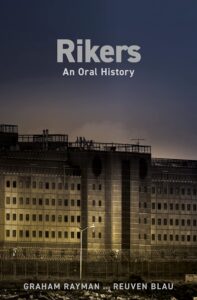
Our bounty of brilliant reviews this week includes Charles Arrowsmith on Bret Easton Ellis’ The Shards, Rebecca Mead on Prince Harry’s Spare, Laura Tanenbaum on Jason McBride’s Eat Your Mind, Nikhil Krishnan on Tom Crewe’s The New Life, and Dwight Garner on Graham Rayman and Reuven Blau’s Rikers: An Oral History.
“…it all unravels like a kind of ultraviolent YA novel, Beverly Hills, 90210 meets Henry: Portrait of a Serial Killer. Mercifully, Ellis’ writing elevates the material above his recent movie efforts … This is actually kind of a problem for The Shards, Ellis’ longest novel. It’s one thing if characters are performatively vacant or vacuous — American Psycho and Glamorama are long too, but in those books it’s a joke that no one can keep the characters straight. Without the satirical flourishes, there’s often little to hold onto as the schooldays and coke parties and sex scenes drift by. Though the vibe is well sustained, it feels at times like a miniseries that should have been a movie … Ellis is and has always been in the business of mood: literature as playlist, as locker-room fantasy, as script treatment. That can work well in 200-page zingers like Less Than Zero or Imperial Bedrooms. At 600-pages-plus, The Shards is a harder sell, however sun-drenched and blood-soaked it may be. If you’re interested in the semiotics of Ultravox or the quickest route to Malibu, you’re in for a great time. But The Shards lacks the delirious absurdism and the tight control of Ellis at his best. For all its porno doominess, it often elicits little more than a mild wow.”
–Charles Arrowsmith on Bret Easton Ellis’ The Shards (The Los Angeles Times)

“…much anticipated, luridly leaked, and compellingly artful … King Charles, as he became upon the death of Queen Elizabeth, in September, will not find much to like in Spare, which may offer the most thoroughgoing scything of treacherous royals and their scheming courtiers since the Prince of Denmark’s bloody swath through the halls of Elsinore … Another spectral figure haunting the text of Spare—that of Harry’s ghostwriter, J. R. Moehringer. Harry, or his publishing house…could not have chosen better … Moehringer has what is usually called a novelist’s eye for detail, effectively deployed in Spare … Elevating flourishes like these give readers—perhaps British ones in particular—a shiver of recognition, as if the chords of Jerusalem were being struck on a church organ. But they also remind those readers of the necessary literary artifice at work in the enterprise of Spare, as Moehringer shapes Harry’s memories and obsessions, traumas and bugbears, into a coherent narrative: the peerless ghostwriter giving voice to the Shakespeareless prince. Moehringer has fashioned the Duke of Sussex’s life story into a tight three-act drama … Spare is worth reading not just for its headline-generating details but also for its narrative force, its voice, and its sometimes surprising wit … There is a certain amount of score-settling and record-straightening, which, though obviously important to the author, can be wearying to a reader … Above all, Spare is worth reading for its potential historical import, which is likely to resonate, if not to the crack of doom, then well into the reign of King Charles III, and even into that of his successor … Spare is, you might say, Prince Harry’s Mousetrap—a literary device intended to catch the conscience of the King, and the King after him.”
–Rebecca Mead on Prince Harry’s Spare (The New Yorker)
“…it’s easy to see Acker and her work as a relic of a lost world. The remnants of the downtown scene that lingered when I visited that archive are long gone. The fashion for the postmodern theory that gave her work cachet in academia has faded, often remembered, if at all, as an embarrassing product of a decadent period when tenured would-be radicals, faced with a political reaction, substituted arcane theory for material analysis or action. But Acker had a deep and lasting impact on those who encountered her and her work, as McBride demonstrates. He quotes Neil Gaiman, who updates Brian Eno’s famous line about the Velvet Underground to note that not many people bought Acker’s books, but nearly everyone who did wrote their own books, and wrote them differently than they would have without her. Through the force of her originality and irreverence, Acker’s work outlived the trends that helped elevate it … She wrote about sex work, abortion, pornography, queer sex, kinky sex, trauma, and abuse both explicitly and poetically, in ways that transcended the debates, feminist or otherwise, that swirled around these topics. Like her bohemian heroes, taken more from the European avant-garde than from the American counterculture, she tried to live and write as if the revolution had already happened.”
–Laura Tanenbaum on Jason McBride’s Eat Your Mind: The Radical Life and Work of Kathy Acker (The New Republic)
“One of the ways in which the internal censor makes itself felt is through the familiar prickings of shame, an experience that has linked gay people across generations. And when moral modernizers, in the late nineteenth century, began to argue that homosexuality was no reason for shame—and when, conversely, the perils of their stance were made clear by the public reaction to the trial of Oscar Wilde—gay writers had to confront another, more complex feeling: shame at feeling ashamed, at being afraid, at being a liar. Tom Crewe’s début novel, The New Life, is a genealogy of both kinds of shame, tracing a line back to the first generation of men to seek a way out of these burdens … Crewe distinguishes himself both as novelist and as historian. He has clearly done what G. M. Young, the great scholar of Victorian England, once recommended: to read until one can hear the people speak. Crewe’s Victorians do indeed sound like human beings, not period-piece puppets. He has, more unusually, found a prose that can accommodate everything from the lofty to the romantic and the shamelessly sexy … The element of “alternate history” is all the more potent for its subtlety. Crewe is not trying, wishfully, to give his characters the happy endings they were denied in life. In many ways, his fictional Addington and Ellis have an even harder time of it than their historical counterparts. Imagining them going through the anxieties of a trial becomes a way to probe not only the emancipatory project of Crewe’s eminent Victorians but also the mental toll of their stigmatized sexualities.”
–Nikhil Krishnan on Tom Crewe’s The New Life (The New Yorker)

“There is so much material in this book that it’s hard to condense one’s impressions. ‘Futility’ is the first word that comes to mind. Everyone knows that Rikers is worse than a hellhole, the kind of place a civilized society should not countenance, but its problems, despite decades of sound advice from special commissions and elsewhere, seem intractable. Everyone, at this point, stares out at their intellectual opponents like boxers at the start of the ninth round. Reading Rikers, you begin to understand those who have called for closing the prison entirely … [Jan] Morris had a special loathing for bureaucratized cruelty, and she visited courts too for ‘the pure pleasure of offering the accused a smile of sympathy, while eyeing judges, court clerks and self-satisfied barristers with a deliberate look of mordant ridicule.’ The inhumanity described in Rikers: An Oral History makes you want to do something similar with prisons. The final chapters of this book are intensely moving. Rikers changes you; it leaves you worse off than you were before you arrived. People who leave aren’t sent off with much outside this warning about a recidivist curse: ‘When you leave Rikers, don’t ever look back, don’t look back in the car or the bus, or else you’ll come back.’”
–Dwight Garner on Graham Rayman and Reuven Blau’s Rikers: An Oral History (The New York Times)

